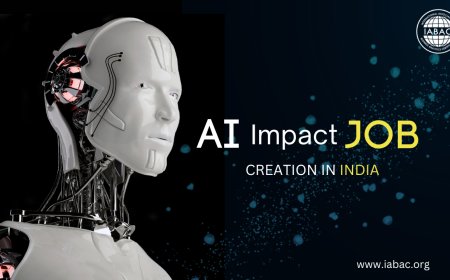The Importance of an Artificial Intelligence Certificate
Discover why obtaining an artificial intelligence certificate is essential for career advancement in the rapidly evolving tech industry.

Artificial intelligence (AI) is quickly becoming a need for every industry because of its unmatched capacity for data analysis, productivity, and creativity stimulation. Artificial Intelligence is changing various industries, including healthcare, banking, retail, and manufacturing. It is creating possibilities for productivity and development. Global business environments are changing as a result of their capacity to extract knowledge from large databases, simplify processes, and personalize experiences.
since companies depend steadily on AI, there is an increasing need for qualified experts in AI-related fields. Funding education and training initiatives are important to provide workers with the skills they need to effectively use artificial intelligence.
Types of Artificial Intelligence Certificate.
Introductory Certificates:
-
Provide a basic understanding of AI principles such as data analysis and machine learning.
-
Perfect for those just starting to learn about AI; no previous knowledge is required.
Advanced Certificates:
-
Offer specific knowledge in advanced artificial intelligence fields like computer vision and natural language processing.
-
Perfect for those who have a solid understanding of the principles of artificial intelligence but are looking to learn more.
Industry-Specific Certificates:
-
specifically designed for professionals in fields such as banking or healthcare, with an importance on applying AI to solve problems unique to each domain.
-
Improve skills pertinent to particular sectors and increase employment opportunities.
Specialized Training:
-
Develop advanced AI applications and technology to prepare people for positions requiring this kind of knowledge.
-
Provide chances for creativity, investigation, and connection with business associates.
AI certifications are available in numerous fields, meeting the needs of people with distinct experiences in the field and skill levels. These qualifications provide chances for professional development and success in the quickly developing field of artificial intelligence, subject to whether one is looking for industry-specific applications, specialist knowledge, or foundational understanding.
What is the importance of an artificial intelligence certificate?
An artificial intelligence (AI) credential is highly valuable in this professional environment for several reasons. Let's quickly go over its main features:
-
Validation of Expertise: An AI certificate improves credibility and dependability in professional circles by providing concrete proof of knowledge of AI ideas, algorithms, and technology.
-
Career Opportunities: A certificate in artificial intelligence (AI) can lead to better work prospects, professional growth, and income potential as companies look increasingly for AI specialists to promote innovation and tackle challenging issues.
-
Structured Learning: AI certifications provide a systematic method for people to study advanced subjects, gain basic knowledge, and focus on particular areas of interest within the field of artificial intelligence.
-
Practical Experience: Certificate programs frequently involve practical experience and hands-on projects, giving students the tools and skills they need to effectively apply AI in everyday situations.
-
Continuous Learning: completing AI certificate programs promotes lifelong learning and professional development by keeping people informed of the latest developments and trends in AI technology.
-
Networking and Collaboration: Through collaboration and networking possibilities within the AI community, certificate programs connect students with experts, professionals in the field, and possible companies or collaborators.
-
Community Engagement: Enrolling in AI certificate programs allows people to join an active learning community that promotes information exchange, guidance, and teamwork on practical projects.
-
Career Growth: The knowledge and contacts received through AI certificate programs can be very beneficial for advancing one's career in the quickly developing field of artificial intelligence.
Types of Artificial Intelligence.
Narrow AI (Weak AI):
-
specializes in performing specific roles or responsibilities, including image classification or speech recognition.
-
Streaming platforms' algorithms for suggestions and virtual assistants like Siri and Alexa are two examples.
General AI (Strong AI):
-
possesses intelligence similar to that of a human being as well as the capacity to understand, pick up, and use knowledge in a variety of situations.
-
General AI is currently logical and has not yet been implemented; its goal is to duplicate human reasoning and thinking.
Machine Learning:
-
A branch of artificial intelligence that works on creating algorithms that let computers learn from data and make decisions or predictions without needing to be explicitly programmed.
-
Predictive analytics, natural language processing, and driverless cars are some examples of applications.
Deep Learning:
-
A branch of machine learning that uses multiple-layered neural networks, or "deep" neural networks, to show computers how to recognize complicated patterns and representations from huge amounts of data.
-
we utilized in medical evaluations, language translation, and picture and speech translation.
Reinforcement Learning:
-
Involves using rewards for good behavior and penalties for undesirable behavior to teach computers to make decisions like how humans learn by making mistakes.
-
Applications include robots, autonomous systems, and games (like AlphaGo).
Developing knowledge about different kinds of AI can help one better understand its many different uses and capabilities across many kinds of industries.
Uses of Artificial Intelligence.
Since artificial intelligence (AI) has so many useful applications in so many different disciplines, it has been ingrained in our daily lives. This integration can be observed by virtual assistants such as Siri, Alexa, and Google Assistant, which use natural language commands to help users with tasks, respond to questions, and operate smart home devices. AI-driven recommendation systems also improve user experiences by analyzing user activity and delivering customized recommendations for goods, articles, music, movies, and TV shows based on personal tastes.
With statistical analysis, artificial intelligence (AI) allows organizations to make well-informed decisions by gleaning insights from large datasets. It improves productivity and creativity in many industries, including marketing, banking, and healthcare. AI also powers self-driving cars and helps with natural language processing, which enhances communication via chatbots and language translation. These uses highlight how AI may revolutionize an industry by increasing productivity, improving user experiences, and promoting creativity and expansion.
Artificial intelligence (AI) has transformed methods, increased productivity, and promoted innovation to the point where it is now critical in several businesses. The growing use of AI highlights the need to obtain relevant expertise and experience through certifications catered to various specializations and levels in the industry. These certificates offer organized learning opportunities, real-world experience, and networking opportunities in addition to validating proficiency. Getting an AI certificate can open doors for job advancement, professional development, and success in the ever-changing and quickly evolving field of artificial intelligence (AI), as technology continues to advance and permeate every area of our lives.











































